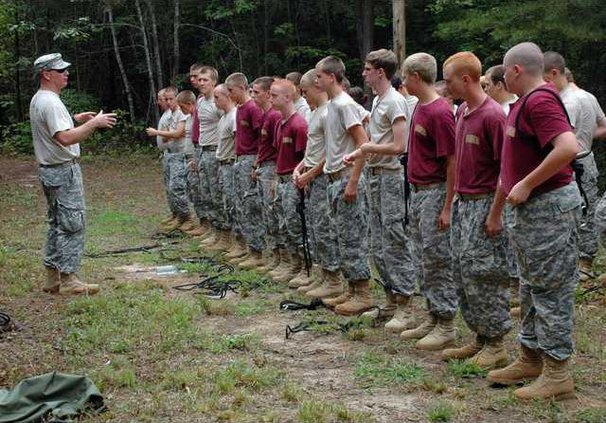In just three years the Dawson County High School JROTC Department has seen more than a 30 percent increase in student enrollment.
According to Lt. Col. Johnnie Sweatte, who has overseen the program since its launch, JROTC currently has 134 students, up from the 87 in its first year.
He said the program is already outgrowing its current facilities and has plans for a new 10,000-square-foot building to be located behind the high school.
The project could potentially be financed through ESPLOST funds, or Education Special Purpose Location Option Sales Tax.
"This program is just a phenomenal transformation for high school students. They are learning those skills that I call ‘life skills' that hold them in good standing when they walk out that door," he said.
JROTC is separate from ROTC programs and is not to be confused with requirement training, he said.
"Junior ROTC is designed to make you a better citizen. It is really not a focus to enlist in the Army or to go into the military. It is designed to give you structure, discipline, responsibility and accountability," he said.
For senior Lauren Dare, a battalion commander, responsibility is the "backbone of the program."
"It is all about doing what is right and helping your peers around you," she said.
Cadets in the program stand out for more than just their responsibility too. Every Thursday is uniform day in the elective course.
"The first day we wore it I remember feeling kind-of embarrassed because everybody is looking at you," Dare said, reflecting on that day three years ago.
"Still, I could not wait to wear it. I remember I was so excited those first couple weeks. You just feel so professional looking ... and it shows teamwork, that you are part of a bigger unit."
Andrew Lovingood, 16, a command sergeant major, said he always is proud to wear the camouflage uniform.
"For one, you are wearing the uniform to support what it stands for. But you are also teaching etiquette because you have to wear the uniform in a certain way. It teaches you how to present yourself in a better manner," he said.
After-school programs for cadets include color guard, rifle team and a Raider Team, which competes athletically with other JROTC programs in the state.
Dare overlooks the Raider Team, explaining it as "a high adventure training team with obstacle courses, running, push-ups, sit-ups and rope bridges," while Lovingood leads the color guard and rifle team.
Both view their leadership positions as an honor and said they have seen it affect their daily lives.
"I have coached wrestling for two years now and the JROTC program has helped me understand how to talk to people instead of just giving them the immediate information. It taught me how to give leadership feedback to peers," he said.
Likewise, Dare said it helped her as a swim coach this summer.
"I felt like I knew how to take control of people without yelling all the time. I knew what to do and it showed them I was in control," she said.
"And in life, now if somebody is doing something wrong I will speak up instead of sitting there being an observer."
Lovingood hopes to be a civil engineer one day, while Dare is planning on seeking a master's degree in nursing. They both emphasized that joining the JROTC was a natural fit since they come from military families.
"My mom and dad both came from the military," Dare said.
Lovingood added: "My great-grandfather served in World War II and my grandfather served in the Navy."
Like many students in the program, Dare, 18, said she loves being a part of a program that is based on honor and respect.
"The program shows how much you can develop and become a leader. It's just amazing if you look at the progress. We started as nothing and now we are commanders," she said.
In May 2014, when Lovingood is set to graduate he will be one of the first students to finish a full four years in the program.
When he looks toward the future he thanks the program for instilling "confidence."

